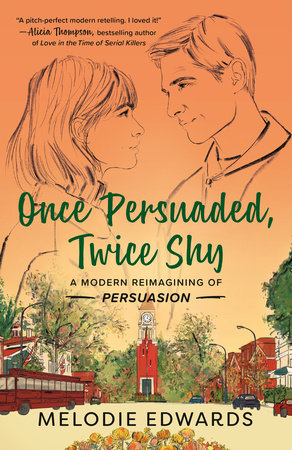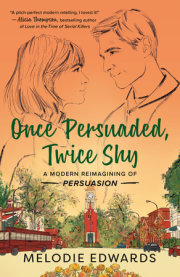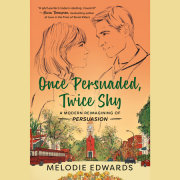One
She should have kept her flats on.
Anne had made a hard rule for herself several years ago, when she thought striding around in her high heels would give her authority and also maybe calf definition. It did neither. It gave her aching feet and ruined her designer pumps.
Louboutins should never be treated liked that.
So, she made a rule. Flat shoes during the day, when she needed to get from her office to the box office, to backstage, to the lobby, in a hurry. Flat shoes in the evening right before the performance when the whirlwind of last-minute panics, missing props, drunk VIP guests, and ancient ushers losing their hearing aids down a seat back kept her running.
And only after that, maybe sometime around the third act, would she nip back to her office, touch up her makeup, slip into her cocktail dress, and swap her flats for heels. Then she'd be poised and ready in the lobby by last curtain call, ready to greet patrons and ready to make her speech as executive director of the Elysium Theatre Festival, while champagne flutes circulated.
This evening she had been lulled into a false sense of security. Everything had been running so smoothly.
And now-and she really could not believe she was dealing with this shit-she was walk/running from her office to backstage, her narrow-skirted dress and high heels cutting short each stride, while her assistant, Emmie, rushed along beside her-talking a mile a minute, trying to explain why their lead actress was suddenly convinced her dressing room was haunted-barely breaking a sweat in her ballet flats. Smart girl.
". . . and then after last night's ghost tour they took her to the Angel Inn for lunch, and you know how they like to take tourists down into the cellar and show them the original old beams with the musket-ball scars and talk about the ghost of Captain Butler who died there, and after that they took her to Fort George, where they were doing historical battle reenactments for the afternoon . . ."
Anne grimaced. "Two reports of upset school trips at the fort and now this. No one freaks out when they go to Colonial Williamsburg; why can't we make that our model?"
The town of Niagara-on-the-Lake, of which the Elysium Theatre Festival was the centerpiece, sat wedged between the shores of Lake Ontario and the mouth of the Niagara River, and downstream from the famous Niagara Falls. Its character was a confusing mix of year-round small-town life and seasonal leisure playground; it boasted several spas, a golf course, boutique shopping, romantic hotels, and endless hectares of surrounding wineries. It was also home to multigenerational farmers and small-business owners, a tractor festival, a beloved main street preserved from the last century, and miles and miles of hiking trails frequented by the locals. It had been an early site for European pioneers settling in the new world and had many confusing remnants from its journey through the eighteenth, nineteenth, and twentieth centuries, not cleared away as they are in modern cities, but still standing as the local pub or courthouse or military graveyard. The town was nestled up as close as possible to the American border and had been the site of the infamous and bloody War of 1812: both Fort Niagara on the American side and Fort George on the Canadian side, once manned by the British, still stood-stone and wood and grass edifices forever peering tiredly across the river at their old adversaries.
That the historical society wanted to use this living history to enliven the town was commendable. That they were terrifying tourists and visiting actors was less than lovely. It was just like their idea two years ago-equally ill-conceived, in Anne's opinion-to reintroduce Canadian geese to the pond in the theater gardens. And now they had that one lunatic goose who kept dive-bombing the glass theater doors like it was his primordial purpose. He'd managed to get in once, squawked straight for the bar, and ended up flapping around madly with a martini shaker stuck on his head so that Emmie named him Double-Oh-Goose. The historical society was mysteriously absent when Anne had called them to come deal with that situation.
She smothered her frustration with them now. "Make a note for tomorrow: call Professor Davis at the historical society and . . ."
"Tell him his ass is fired and he'll never work in this town again!" Emmie cut in with relish.
"Absolutely do not do that; we are not firing anybody." She enjoyed mentoring Emmie, truly, but the girl's bloodlust was beyond comprehension. What were they doing in business school these days-just watching House of Cards on a loop?
"Please politely ask Professor Davis to tone it way, way down. And he if starts talking about his PhD and verisimilitude, you may politely remind him that I'm also a town councilor, and terrifying the tourists will be considered a detractor when we negotiate his annual funding. Never threaten someone you need to work with, Emmie; only gently remind them where their best interests lie."
They pushed through the heavy double doors that separated the office suites from the labyrinth of backstage areas, Anne treading carefully as they crossed over a steel-grate walkway just looking for a dainty stiletto to snap, and wound through several twisting hallways, the walls carpeted to baffle sound. A panel was starting to peel in one corner; Anne made a mental note for the production crew.
Quiet and dark enveloped them before they emerged into an antechamber that connected the senior dressing rooms, and there they found half the cast of Macbeth assembled watching a stellar diva performance.
"I want to talk to my manager!" Michelle Cranston, lead actress, her hands newly dipped in streaky red paint in preparation for the "Out, damned spot!" monologue, was wailing. "I can't work like this!"
"But we can fire her, right?" Emmie asked under her breath.
If only, Anne thought.
Choi, the artistic director, was standing beside a case of prop swords wringing her hands like she was the one meant to be Lady Macbeth, looking sick and pale. Several of the trees of Birnam Wood were shivering nearby as the stage hands holding them sniggered.
Macduff, Duncan, and Malcolm looked irritated, while Macbeth himself was trying ineffectively to shush Michelle and usher her to her starting spot at stage left. Various other Scottish warriors were watching with avid interest; one had pulled a cell phone out of his kilt and was texting. Ensemble cast should know better than to have their cell phone with them onstage; Anne made a mental note for the stage manager.
Right. This was clearly a disaster about to spiral out of control. She straightened her shoulders and waded in.
"Michelle, I'd like you to take a moment and calm down." Anne's tone was firm but soothing.
"Ms. Elliot!" She made a sweeping gesture of relief, like Anne had come to be her savior instead of coming to kick her back onstage. "I was just in my dressing room, and there was this terrible creaking and groaning sound, and a loud bang . . ."
Anne took a subtle step back as Michelle waved her painty hands, her cocktail dress narrowly escaping a gruesome red-streaked fate.
"Michelle, those noises were the pipes. Our matinee production this season is Singin' in the Rain. We installed a sprinkler system and the pipes were threaded down behind the dressing room walls. The pressure occasionally omits a bang. You already know this."
"It was a ghost."
"It was not a ghost."
"You weren't there. It was a ghost."
"Michelle . . ."
"It was a ghost, because there were details. He's an infantryman, and he's haunting my dressing room probably because some delinquent ancestor of mine killed him on the battlefield. It's xenophobic-he's haunting me because America won the Battle of Niagara."
"Hold up," said Banquo, crossing his arms over his leather chest plate. "Where do you get off thinking you won the Battle of Niagara? Canadians won Niagara in the War of 1812-that's why we have the better view of the falls."
"Canadians didn't win, and the Battle of Niagara was in 1814, you clown," said Arman. His stagehand all-black outfit was covered in red finger streaks. He had been first on the scene when Michelle had come out of her dressing room screeching about ghosts and thrown herself into the arms of the nearest handsome young man, as was her custom. "We weren't even Canadians then. England and France battled it out and France lost. That's why Quebec's still angry."
"Trying to push France out of Niagara was a totally different battle in 1759!"
"What bloody history book did you read?!"
"You know what?" Anne interjected, using her most reasonable voice. "It doesn't matter. It doesn't matter who won, or who lost, or who was what country. You know why? Because it was over two hundred years ago. We are not concerned with a battle that happened over two hundred years ago, and there is no ghost-soldier in your dressing room."
"Infantryman."
"There is no ghost-infantryman in your dressing room. There is, however, an audience of five hundred people waiting for Michelle Cranston, star of the hit TV show Law and Waiting, to deliver her finest performance as Lady Macbeth and show them that Juilliard training never fades."
Michelle preened.
"That's not what's faded," the understudy Macduff sniggered.
Michelle blanched.
Distantly Anne heard the lobby chimes; the backstage lights flickered. One minute to curtain rise.
No more time to play nice.
Anne turned to face Macduff and gave him her sweetest, sincerest smile. "Would you like to contribute meaningfully to this conversation? You've played the corpse on those CSI shows so often, I'm sure you understand the pressure Michelle is feeling moving from television to the stage."
He blushed but quickly folded. "No, Ms. Elliot."
"And, Michelle"-she turned back to Lady Macbeth, still using her mildest tones-"we can, of course, get your manager on the phone, and you can tell him all about the ghost in your dressing room. But I'll need a moment of his time after that, because unfortunately we will have to discuss this breach of contract and how that might affect the advance you were paid for the remainder of the season."
"Hit 'em in the paycheck," Emmie hissed. Anne briefly closed her eyes and exhaled through her nose. Another conversation about diplomacy tomorrow-she made a mental note.
Michelle quavered and then sniffed and raised her chin. "I'm a professional; I've never bailed on a performance."
"I'm so very glad to hear it," Anne said mildly. "Now, everyone take your places, please, before your director keels over from stress."
The cast scattered just as the lights dimmed. Anne moved to put an arm around Choi's shoulders.
"Just breathe in, and out. Deep breaths. Everything is fine; there's only the second half to go. You've had standing ovations all this week, and you'll have another one tonight, and then you'll come join me in the lounge, and you'll drink lots and lots of wine, okay?"
Choi gave a weak smile. "Thanks, Anne. I'm sorry I had to call Emmie to get you. I know I should manage . . ."
Anne shooed away her apologies. "Don't even worry about it. I hired you for your talent. I'm here to problem solve. I've been the executive director of the Elysium Theatre, all three stages, and all adjacent programming for four years now." She took a step back, ready to head to the lobby now that the crisis was averted. The tip of a discarded plastic sword scraped down the side of her shoe, leaving a laddered leather scratch in its wake. She did her best not to wince.
"This is what I do."
Two
There was a standing ovation, just as she'd predicted. Anne stood behind the closed doors, ensconced in the velvety cocoon of the quiet lobby, with only the soft tinkle of the waiters filling glasses nearby. The noise of enthusiastic applause reached her as a softly muffled wave that rose and fell before the ushers opened up the doors and the evening's theater patrons began to filter out.
This was Anne's showtime.
"Mr. and Mrs. Lightbourne, so lovely to see you this evening. Did you enjoy the performance?"
"Delia, it's wonderful to see you back again this year. We were so sorry to hear about your husband's passing last summer . . . Oh you did receive the flowers, I'm glad."
"Sir Phillip, did you enjoy the performance? Yes, our new artistic director, Choi Young, such an incredible talent. We were so lucky to get her after her last Broadway run. I must introduce you later."
"Jason, nice to see you again. And this is your, er, companion? Yes, our staff are circulating with champagne, but of course the bar is open and our very talented bartender will be sure to fix you that drink . . . Pardon? No, your ex-wife declined using her ticket this evening."
"Lilian, so lovely to see you, and your dress is gorgeous! Don't tell me it's couture again-it'll break my heart to know I can never own one like it."
A gentle touch to the elbow here, a gracious smile there, the picture of elegance and poise, with not a drop of her earlier haste, Anne wove her way among the attendees with all the grace of a well-choreographed dancer on full charm offensive. She greeted circulating patrons, delicately made introductions, and subtly signaled waiters when a drink refill was needed or should be neglected based on the sobriety of the guest.
When Anne's mother passed away four years ago and the role of executive director of the festival was left open, the board of directors had tutted and fussed over giving the position to Anne. That an Elliot had always run the festival, for as many years as it had been around, was inescapable. That the Elliots were considered a first family of Niagara-on-the-Lake, and used to own much of the town's property, was undisputed. That Anne's qualifications were excellent, an MBA and a bachelor of commerce degree from a first-rate university with a minor in arts management, was unquestionable. That she had been twenty-eight, delicate looking and soft-spoken, did not drink, and did not play golf was somehow-as Anne would come to realize-an insurmountable series of faults.
The five board members had sat around the conference table that June, their patronizing smug smiles never wavering as they told her.
Anne had come to the meeting prepared to prove that she did not expect to be awarded the job based on tradition or nepotism. She had her résumé, her notes on the theaters' finances, and her business proposals neatly laid out for how to capture a wider market, and she would not mention that she'd been handling more and more of her mother's day-to-day tasks since the cancer diagnosis and that she had de facto now been doing the job herself for some time.
Copyright © 2024 by Melodie Edwards. All rights reserved. No part of this excerpt may be reproduced or reprinted without permission in writing from the publisher.









